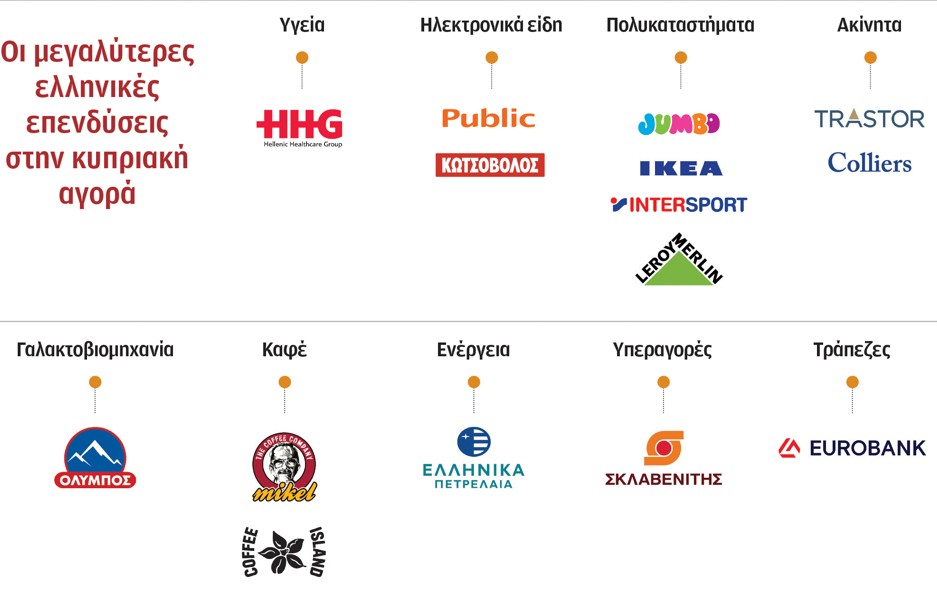
Newsroom
In recent years, a wave of Greek companies has been making significant strides in Cyprus, investing across various sectors and expanding their reach. The trend underscores Cyprus's appeal as a strategic hub for Greek businesses aiming to enter broader markets, especially in the Middle East. Greek companies have been attracted to Cyprus due to its political stability, strong economic outlook, and favorable tax system. Over 1,500 Greek-owned companies now operate in Cyprus, spanning industries like food, shipping, retail, energy, and insurance.
According to an article by Kathimerini's Dorita Yiannakou, notable players such as Hellenic Petroleum, Jumbo, the Fourlis Group (operating IKEA, Intersport, and Leroy Merlin), and the Sklavenitis supermarket chain have been expanding their presence. In the banking sector, Eurobank became the major shareholder of Hellenic Bank, enhancing its stake in the Cypriot market. Similarly, Alpha Bank Cyprus and National Bank of Greece also maintain a strong presence in Cyprus.
In insurance, Hellenic Bank has strengthened its position through a deal with CNP Assurances to acquire CNP Cyprus Insurance Holdings, further consolidating its influence in the local market.
The retail sector has seen dynamic changes too, with Sklavenitis integrating Papantoniou Supermarkets, bringing its total stores in Cyprus to 27. Meanwhile, Greek food chain Goody's has made a successful return to the Cypriot market, opening stores in Limassol and Nicosia.
Olympos, a dairy giant, has diversified into steel production with a €70 million investment in Cyprus. The Greek company has acquired a significant stake in NT Kouroussiis Limited and opened a steel production facility, planning to export steel to Romania and Bulgaria.
Electric cars are another area of focus, with the Greek Sfakianakis Group partnering with BYD, a Chinese electric vehicle manufacturer, to bring the brand to Cyprus.
Technology is also a growing sector, with Kotsovolos, after being acquired by PPC, opening stores in Cyprus, while Jumbo continues to expand its retail footprint with new store openings.
Greek companies are making inroads in the energy sector as well, with Helleniq Energy acquiring multiple photovoltaic parks, bringing its renewable energy capacity in Cyprus to over 40 MW. EKO Energy, a subsidiary of Hellenic Petroleum, is also increasing its operations in the green electricity market.
In real estate, Greek company Trastor SA has entered the Cypriot market with the acquisition of a €39 million mixed-use property and plans to expand its portfolio further.
Meanwhile, Hellenic Healthcare Group, under the US-based CVC Capital, is building a new medical center in Limassol, enhancing Cyprus’s healthcare sector.
Finally, the SuperHome Centre DIY chain is set to be sold to a Greek investor, signaling continued Greek interest in Cyprus’s retail and investment sectors.
While this influx of Greek business is widely seen as a positive development for Cyprus, it also highlights the challenges faced by local, family-owned businesses, particularly in manufacturing. Some stakeholders note that Greek companies have, in the past, used the Cypriot market to offset losses in other regions, raising concerns about the risks of over-reliance on the island for financial recovery.
Overall, the growing presence of Greek companies in Cyprus signals a dynamic shift in the island's economic landscape, offering opportunities for job creation and investment, while also underscoring the competitive pressures faced by smaller, local enterprises.
*To read more of Dorita Yiannakou's article and gain full access to in-depth reports (in Greek), subscribe now to Kathimerini's print edition and stay informed with comprehensive coverage on this and more!
































